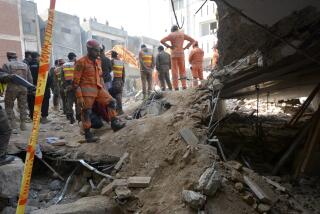Pakistan acknowledges surviving Mumbai gunman is a Pakistani
- Share via
ISLAMABAD, PAKISTAN — Breaking weeks of silence on a highly sensitive subject, Pakistani authorities acknowledged for the first time Wednesday that the lone surviving suspect in the Mumbai attacks is a Pakistani national.
Authorities here have been extremely reluctant to formally acknowledge Pakistani links to the shooting rampage in India’s commercial and entertainment hub, even though Indian officials had almost immediately identified the captured man, Ajmal Amir Kasab, as a Pakistani.
Reflecting the degree of official squeamishness on the subject, Pakistan’s government late Wednesday said it had fired its national security advisor, Mahmud Durrani, a highly respected former ambassador to the United States, for giving unauthorized interviews about the Mumbai attacks.
Pakistan has been under heavy U.S. pressure to move against militants based on its soil who are suspected of having planned and aided the attacks six weeks ago, which left more than 170 people dead.
However, India’s swift finger-pointing in the wake of the onslaught angered Pakistanis. Many people here do not accept the Indian contention, backed up by U.S. intelligence, that the banned Pakistani-based group Lashkar-e-Taiba carried out the shootings.
Mindful of pervasive nationalistic sentiment at home, Pakistan’s weak civilian government has tried to strike a balance between meeting international expectations that it will carry out a thorough investigation and avoiding the appearance of knuckling under to the demands of India, its archrival.
So strong is the taboo surrounding any acknowledgment of Pakistani ties to the case that Kasab’s nationality was at first confirmed here only by Pakistani officials speaking on condition of anonymity. Hours later, Information Minister Sherry Rehman said in a terse text message: “We are confirming Kasab is Pakistani, but investigations are ongoing.”
Pakistani media generally shied away from attempting to confirm the man’s identity. However, a month ago the British newspaper the Observer reported that it had ascertained his origins using national identity cards and voter registration rolls in Faridkot, the village in Punjab province that Indian authorities identified as Kasab’s hometown.
Nine gunmen were killed in the attacks.
India this week presented Pakistan with a 100-page dossier of evidence, including what it said were transcripts of intercepted calls between the gunmen and their handlers in Pakistan during the assault on luxury hotels, a train station and a Jewish center.
The transcripts painted a chilling portrait of the attacks. Excerpts printed Wednesday by the Indian newspaper the Hindu indicated that the gunmen repeatedly called their handlers for instructions.
“We have three foreigners, including women,” a gunman reportedly said in one such call. “Kill them,” came the reply.
The transcripts also recorded the gunmen confessing to a key blunder -- having left behind a satellite phone on a hijacked vessel used to sail to Mumbai from the Pakistani port of Karachi.
Although India and Pakistan have engaged in a degree of saber-rattling in the weeks since the attacks, Pakistan made new efforts to cool the harsh rhetoric of recent days.
“Pakistan does not want war,” Foreign Minister Shah Mehmood Qureshi said Wednesday during a visit to Kabul, Afghanistan. “Pakistan wants peace. Pakistan wants regional stability.”
--
--
Special correspondent M. Karim Faiez in Kabul contributed to this report.
More to Read
Sign up for Essential California
The most important California stories and recommendations in your inbox every morning.
You may occasionally receive promotional content from the Los Angeles Times.













